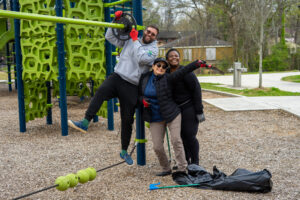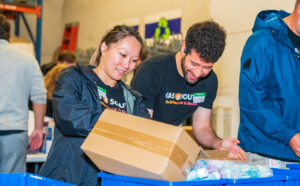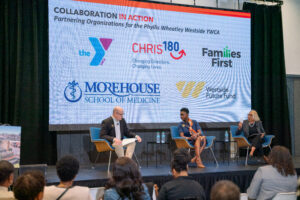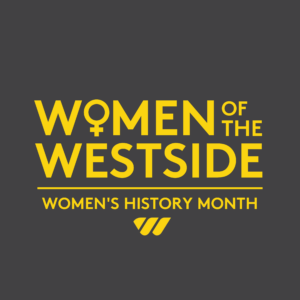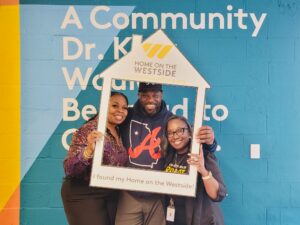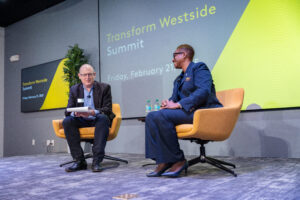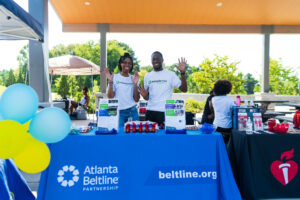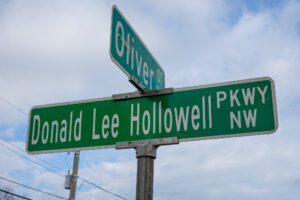Every April, National Volunteer Month offers a meaningful opportunity to thank the people who give their time, talents, and hearts to serve our greater community. Here in our community, the people who power the WFF Volunteer Corps are neighbors, community champions, and essential partners in our mission to restore Atlanta’s historic Westside.
Their dedication brings our vision to life.
Volunteers come from all walks of life and backgrounds. Some are longtime residents. Others are students, professionals, or families who believe in investing their time where it matters most. What unites them all is a shared belief in the potential of this historic community and a willingness to be part of something bigger than themselves. Through our volunteer initiative, the WFF Volunteer Corps, we work hand-in-hand with more than 60 local nonprofit agencies to support our impact areas of education, housing, and health and wellness.
“At Westside Future Fund, we’re committed to working with the community to help restore and preserve the rich history and strength of the historic Westside,” said Raquel Hudson, Director of Property Assets & Volunteer Programs at Westside Future Fund. “Our volunteers play a vital role in that mission by joining hands with our neighbors, showing up consistently, and investing their time in the places and people that make this community so special.”
In 2024, more than 3,000 volunteers engaged in projects across the Westside — a 33 percent increase from the year before. Together, they contributed over 9,100 hours of service, resulting in an estimated $304,926 in community investment. This time and energy was directed toward tangible outcomes, including, but not limited to, the cleanup of 96 tons of trash — for perspective, that’s equivalent to 16 adult elephants. From revitalizing public spaces to supporting community events, our volunteers’ impact is evident on every block of the historic Westside.
The past year was filled with moments that exemplify the power of collective action.
On Martin Luther King Jr. Day this year, over 1,200 volunteers fanned out across over a dozen sites in the community, demonstrating a living legacy of service. Last year, volunteers helped deliver Thanksgiving meals to 292 households in the spirit of the holidays and provided gifts to 222 youth through our Holiday Gift Giving program.
“It was amazing to see so many people come out and support not only our students but our parents, our teachers, and our school community as a whole,” said Dr. Teruko Dobashi, principal of M. Agnes Jones Elementary School, during the 2025 MLK Day of Service. “I think it’s really important for our students to have access to people who look like them, who may not look like them, showing them how to pour into a community so that they can take that and lead and do the same. We’re all about paying it forward here.”
At the heart of this work is a shared commitment to our mission: to advance a compassionate approach to neighborhood revitalization that creates a diverse, mixed-income community, improves the quality of life for current and future residents, and honors the rich history and culture of the historic Westside. Volunteers play a vital role in making that mission possible.
“It means a lot to give back to Atlanta’s historic Westside,” said Bella Smith, a Boston Consulting Group volunteer participating in the 2024 volunteer mobilization at Booker T. Washington High School in honor of its 100th anniversary. “We’re grateful to Westside Future Fund for the opportunity to serve. Volunteering at schools like this is a powerful way to invest in students’ futures and help carry forward the legacy of this historic community.”
Thank you to every person who has stood with us, volunteered with us, and believed in the power of community. Your service is helping to build a stronger Westside — one that Dr. King would be proud to call home.
“English Avenue is the best place in the world to live. Because of the different groups that have come in the neighborhood, we have improved so much,” said Mrs. Thelma Reneau, a local senior, legacy Westside resident, and WFF Anti-Displacement Tax Fund recipient following a visit from Intercontinental Exchange (ICE) volunteers during their 2024 volunteer mobilization. “[The volunteers] came and planted some flowers for me and painted my kitchen, so my house is looking like all of these beautiful new houses [that WFF is building]. Thank you so much.”
Volunteering with Westside Future Fund means becoming part of a movement rooted in love, legacy, and the promise of a better future. Visit www.westsidefuturefund.org/volunteer to learn more about upcoming volunteer opportunities.

